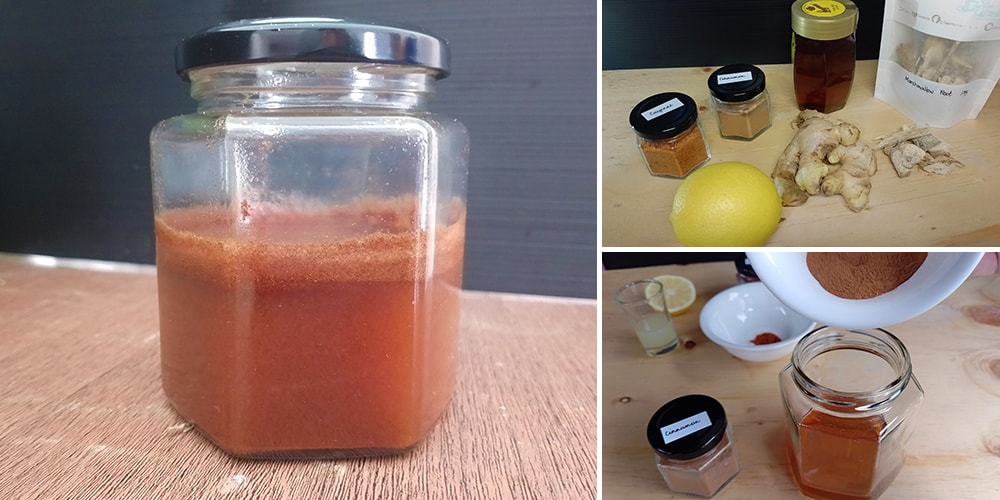
DIY Syrup for Strep Throat
We have all been there. Someone comes home with a little sore throat and everyone catches on until it knocks the entire household down.
What starts as simple cold symptoms of scratchy throat, cough, and swollen lymph nodes could turn into an enfeebling strep throat.
Normally, people would take OTC cold medicine, take some rest, and expect to feel better in a couple of days.
A sore throat that does not fare better with medication is probably the early onset of strep throat. It cannot be cured by any OTC cold medicine but by a prescription antibiotic. According to experts, however, mild strep throat may clear away on its own without treatment but only longer than a cold would. To soothe a strep throat, check out the recipe below.
What Is a Strep Throat Infection?
A streptococcal sore throat or pharyngitis is a bacterial infection of the mucous membrane of the pharynx. It is caused by the notorious Group A streptococcus which is also responsible for other infections like scarlet fever, impetigo, rheumatic fever and cellulitis.
Strep throat manifests itself with cold-like symptoms like cough, runny nose, sneeze and raspy voice. However, some cases of pharyngitis do not come with these cold symptoms.
A strep throat typically comes with the following:
- White patches at the back of the throat
- Tiny red spots in the mouth
- Mild to high fever (some higher than 101ᵒF)
- Swollen lymph nodes
- Difficulty swallowing
- Swollen tonsils
- Headache
In some cases, patients can get a rash on the neck and the symptoms may last longer than 48 hours. In children, strep throat may also include nausea, vomiting and abdominal pain.
I’m sure you’ve had at least one of these symptoms. An interesting fact is that the cowboys from the Wild West took this remedy at the first sign of strep throat. They used it to keep the cold and flu away during the freezing nights in North Dakota.
How To Manage Strep Throat at Home
Strep throat is contagious and spreads from direct person-to-person transmission. For many of us, regardless of the prognosis, a sore throat is nothing worth worrying about. It will get better in time, they would say.
However, when left untreated, severe strep infection may lead to serious complications like a kidney infection, rheumatic fever and joint inflammation. The bacteria can spread into the middle ear, sinuses, skin or blood.
- Don’t take a sore throat lightly. If you feel it scratching your throat, do these simple practices to prevent it from escalating.
- Gargle with warm salt water prepared by dissolving ½ tsp salt into a cup of warm water.
- Take warm liquids like bone broth and herbal teas with honey.
- Use throat spray and medicated lozenges.
- Use a warm or cool mist humidifier.
- Suck on ice cubes or ice lollies to reduce the inflammation.
Home Remedies for Strep Throat
Antibiotic overuse may develop treatment-resistant bacteria. It means that over time, the medication will not cure these pathogens anymore.
Antibiotics also tend to destroy both the good and bad bacteria leading to an upset digestive system while on treatment.
The best you can do with strep throat is to prevent the bacteria from proliferating. As soon as you feel the slight tickle at the back of your throat, reach out for these antibiotics designed by nature.
Garlic
Garlic (Allium sativum) is dubbed as nature’s antibiotic for its potent effect against disease-causing germs. It has antiviral, antifungal and antibacterial properties that are effective against many pathogens, including streptococci. Garlic contains allicin, a compound that is released when garlic is cut. Allicin is a volatile compound that inhibits the growth of streptococcus, staphylococcus and other antibiotic-resistant strains.
Ginger
Ginger (Zingiber officinale) is a popular home remedy for respiratory-related health problems. When used at the onset of an illness, ginger can ward off infection and prevent it from worsening into a serious condition. The gingerol found in ginger is as effective as an antibiotic in managing strep throat. It also has an anti-inflammatory property that alleviates the inflammation that comes along with it.
Cinnamon
Cinnamon (Cinnamomum cassia) has an antimicrobial action that restrains bacterial growth and reduces the discomfort related to strep throat. It also eases the digestive symptoms that come with a throat infection. Taking a pinch of cinnamon or chewing its bark alleviates sore throat and cough.
Cayenne
In homeopathic medicine, cayenne (Capsicum annuum) is valued for its analgesic and anti-inflammatory properties. It contains capsaicin, a compound that numbs the pain and soothes a sore throat. Cayenne is considered as a whole-body antibiotic for its effectiveness in inhibiting the growth of pathogens. Cayenne naturally exhibits a strong burning sensation upon contact. That is why it is only used in small amounts and mixed with water when used as a strep throat gargle.
Honey
The CDC acknowledges the effectiveness of honey in relieving cough and sore throat in patients over one year old. How it works is not thoroughly known but research suggests honey possesses excellent antibacterial and anti-inflammatory properties.
Lemon
Complain about a sore throat and you will generally get unsolicited advice on relieving it with lemon. Taking lemon juice is the best method of easing throat inflammation and congestion. It also provides the body with Vitamin C and other minerals to boost the immune system. Improving your body’s defense is one way of combatting sickness for quick healing.
Marshmallow Root
Not to be confused with the marshmallow confectionery, the root of the marshmallow (Althaea officinalis) has a long tradition of use in alleviating sore throat. Marshmallow is mucilaginous, which means it is an herb with a gelatin-like substance along with other healing properties. The mucilage is what coats the throat and the digestive tract to make it easier to swallow. Marshmallow is best infused in cold water to release its mucilage. Mucilage gets destroyed in hot infusion, hence, using hot water is not recommended.
DIY Strep Throat Syrup
Ingredients:
- 2 tbsp fresh ginger, chopped
- 2 tbsp marshmallow root
- ½ cup honey
- 2 tbsp lemon juice
- 1 ½ tsp cinnamon powder
- ¼ tsp cayenne pepper powder
Steps:
- Infuse the ginger root by simmering it in water until the water is reduced to half. Let cool and place it in the fridge until cold.

- Fill a small jar with the marshmallow root and pour a cup of cold ginger water over it. Cover and allow it to infuse for at least 4 hours or overnight.

- In a separate mason jar, add the rest of the ingredients.

- Strain the ginger-marshmallow infusion and add it over the spices. Stir or shake the jar to mix them well.

- Let it cool completely before putting it in the fridge where it can last for about three months. Use a clean spoon when dispensing to prevent contamination.

Note: If you can’t find marshmallow root, it is okay to omit it. However, it is recommended for a more potent strep throat syrup. You can try looking for it from online stores. Marshmallow is not only good for sore throat. You can store the roots and use them in the future for acid reflux, constipation, and other digestive and respiratory problems.
How To Use
Give 1 tsp of this homemade strep throat relief syrup to children over two years old. Adults can take 1 tbsp of the syrup as needed but no more than 4 times a day. Swallow a spoonful of the syrup slowly to allow it to coat the throat. Do not drink water or any liquid for about 10 to 15 minutes to make it more effective.

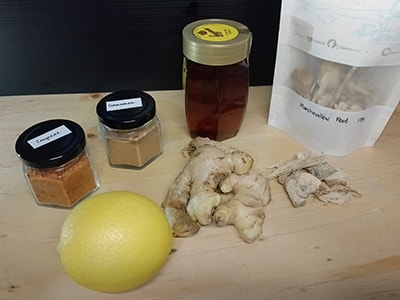

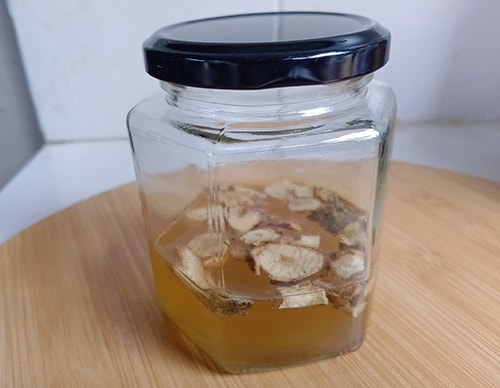
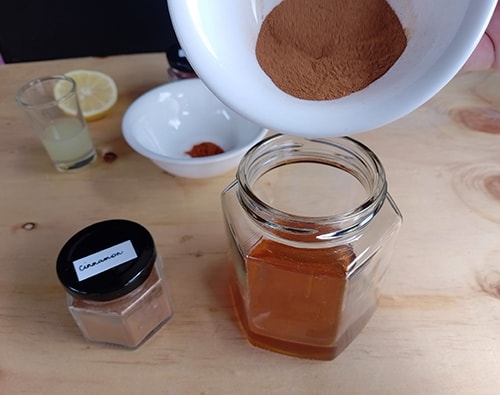
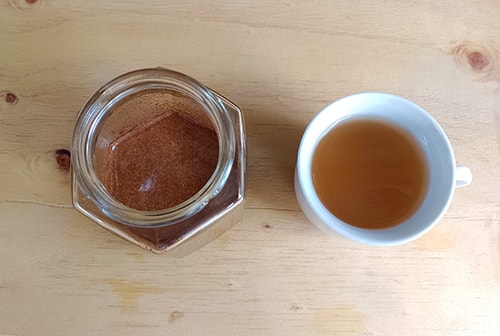
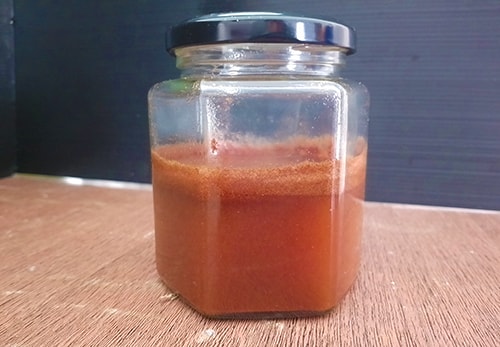
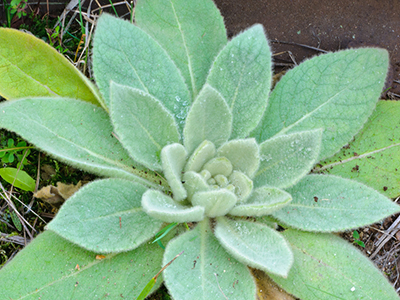
Thank you!!
What is the quantity of water you use to boil the ginger in?
No garlic in the syrup?
Thé recipe is really badly written. Missing elements such as quantity of ginger and quantity of water to use for infusion.
Also how about garlic and lemon??
Mentioned on the explanation and completely omitted in the recipe.
The only thing missing is the amount of water. Peek again at the recipe and the quantities are there
Since the water amount is missing, can you let us know here in the comments?
Actually the water quantity is there. If you are required to pour 1 cup of ginger water over the marshmallow root, and you have reduced the ginger brew by half, then start with at least 2 cups of water.
Hi Albert,
The author of this recipe indeed mentioned garlic as a powerful antibiotic in the section “Home Remedies for Strep Throat”, but did not use it for this syrup. It is not mentioned in the ingredient list. However, feel free to add garlic as well for some extra zing, or make a garlic tea and drink that separately. You can read more here: https://thelostherbs.com/what-happens-if-you-drink-garlic-tea/
The quantity of ginger is mentioned in the ingredient section: 2 tbsp fresh ginger, chopped. The lemon juice was added to the rest of the ingredients (honey, cinnamon, cayenne) at Step 3.
As for the quantity of the water, simmer ginger in two cups of water until it’s reduced to half.
Many blessings and good health!
Can we use marshmallow extract?